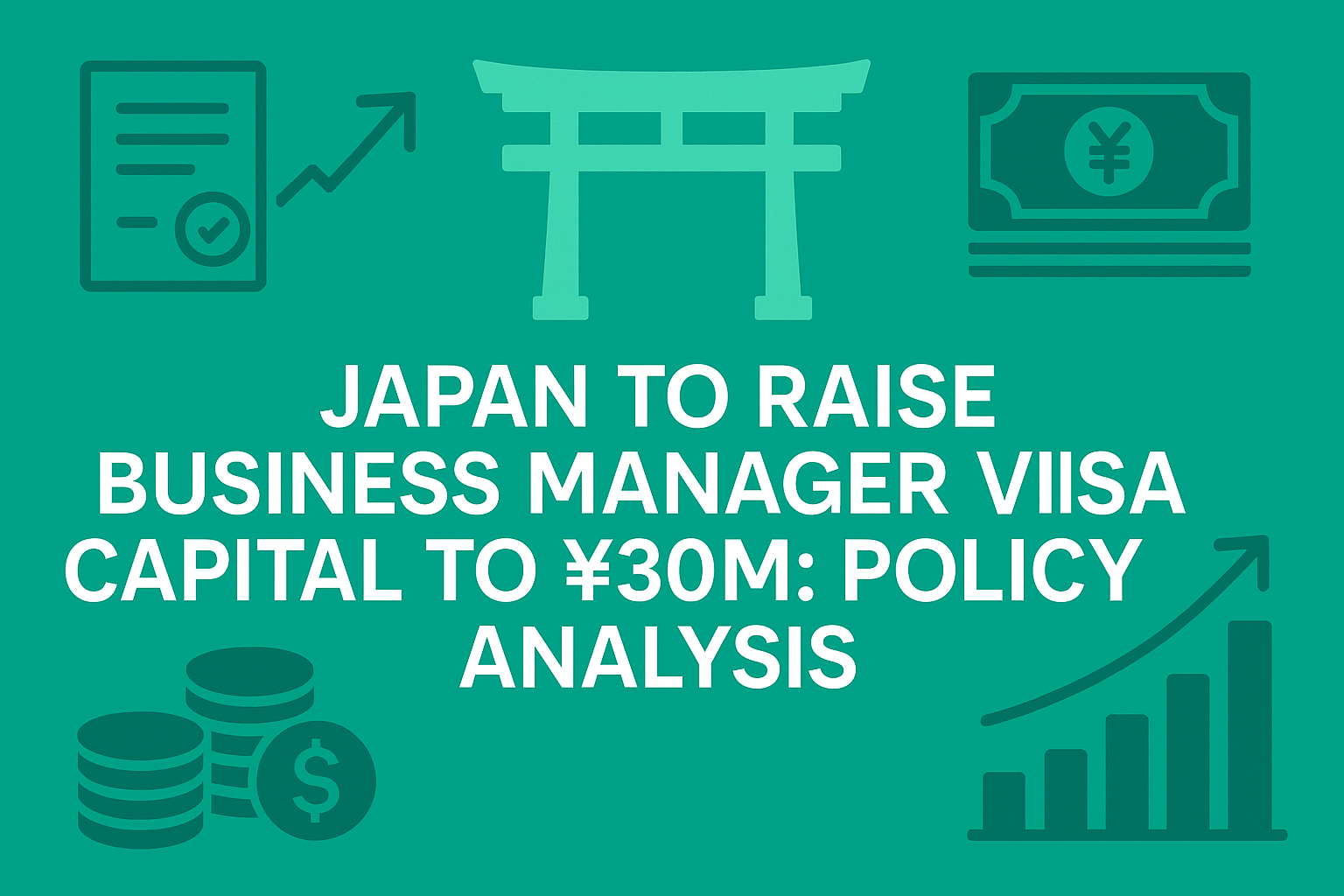— Expectations and Challenges of Raising the Capital Threshold —
Introduction
The Japanese government has announced plans to tighten the requirements for the “Business Manager Visa” for foreign entrepreneurs. The most significant change would be an increase in the minimum capital requirement from 5 million yen to 30 million yen. In addition, new conditions concerning managerial experience, educational background, and mandatory employment of local staff will be introduced.
This report analyzes the expected benefits and potential drawbacks of the reform, while evaluating its broader role and implications for Japan’s economic and immigration policy.
1. Expected Benefits
(1) Promotion of Sound Foreign Investment
By raising the capital threshold sixfold, the reform aims to filter out short-term, non-substantive business applications and ensure that only entrepreneurs with sufficient financial capacity and commitment enter the Japanese market. This is expected to enhance the overall quality of foreign entrepreneurship in Japan.
(2) Job Creation
The requirement to employ at least one full-time staff member directly ties visa eligibility to employment creation for Japanese workers. Compared with the current system, which allowed eligibility solely based on capital, the reform ensures clearer social and economic contributions.
(3) Transparency and Credibility
Requiring certified public accountants or SME consultants to review business plans will reduce administrative burdens while improving objectivity. This strengthens the transparency and credibility of the visa framework and improves Japan’s international reputation as a regulated and fair market.
(4) Long-Term Regional Commitment
By forcing entrants to commit larger amounts of capital and human resources, the reform could lead to longer-term investments and potentially stimulate sustainable growth in regional economies, not just in metropolitan centers.
2. Potential Drawbacks
(1) Exclusion of Small Businesses
Raising the capital threshold risks excluding small-scale foreign businesses such as restaurants, service providers, and IT startups, which typically operate with lower initial investments. This could diminish Japan’s cultural diversity and entrepreneurial dynamism.
(2) Discouragement of Entrepreneurial Talent
The new hurdle of “30 million yen + mandatory employment” may prove excessive for many otherwise promising entrepreneurs. As other countries adopt more open policies to attract foreign talent, Japan may become less competitive in the global race for entrepreneurial human capital.
(3) Rigid Implementation
The introduction of managerial experience or postgraduate education requirements could filter out young, innovative entrepreneurs with high potential but limited track records. The system risks stifling innovation by excluding non-traditional entrepreneurs.
(4) Perception of Inequality
Japanese citizens can establish companies without any capital requirement, while foreigners would face a threshold of 30 million yen. This discrepancy may be viewed internationally as discriminatory regulation, potentially damaging Japan’s attractiveness as an investment destination.
3. Policy Role and Challenges
The reform is designed to function as a filter, attracting only “serious investors and entrepreneurs” who can make a tangible contribution to the Japanese economy.
However, if applied too rigidly, the system risks suppressing diverse entrepreneurial activity, thereby weakening Japan’s global competitiveness and reducing the vibrancy of its cities.
The central policy challenge is to balance:
- Ensuring genuine business quality, while
- Maintaining openness to diverse and innovative entrepreneurial talent.
One possible direction is to link the Business Manager Visa with Japan’s Highly Skilled Professional visa or specific startup support programs, thus combining strict regulation with flexible pathways for high-potential entrepreneurs.
Conclusion
Raising the capital requirement for the Business Manager Visa is expected to strengthen Japan’s immigration and business framework by filtering out unqualified cases, promoting job creation, and enhancing transparency.
At the same time, the reform risks excluding small but innovative businesses, discouraging entrepreneurial talent, and reducing Japan’s attractiveness compared to other countries.
Ultimately, the reform should be designed around a dual principle: guaranteeing the quality of entrants while safeguarding diversity and innovation. Without this balance, Japan may secure “stability and control” but lose future engines of growth.


